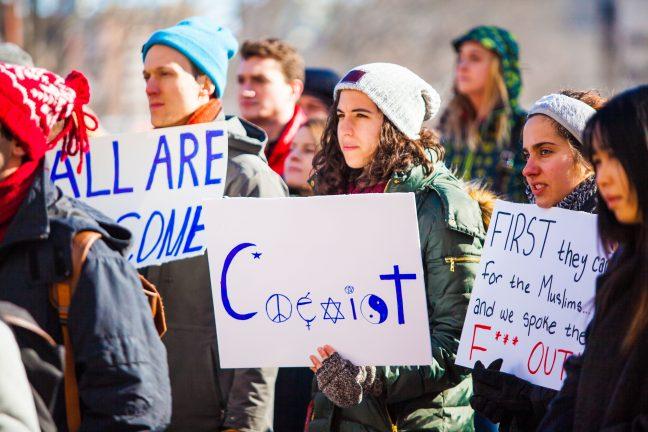When University Housing proposed controversial changes to the existing “pay-as-you-go” dining policy in December 2017, student activists of all persuasions spoke out against the decision. Among the voices were interfaith fellows, arguing that mandatory deposits weren’t just burdensome for low-income students, they violated Housing’s commitment to diversity and inclusion by disregarding students with religious dietary restrictions. Because the dining halls don’t provide adequate kosher or halal dining options, the policy isolated observant students while asking them to spend beyond their means.
The fellows belonged to the Center for Religion and Global Citizenry, the University of Wisconsin’s premier organization for interfaith dialogue and religious pluralism — and a growing force for social activism. Established in 2017 following the Lubar Institute’s closing, the center intends to become a hub for discussing religious pluralism at UW and in the Madison community.
In the wake of the Tree of Life massacre, the Center drew attention to antisemitism on campus and participated in an interfaith vigil led by UW’s Jewish communities. The Center’s director, Ulrich Rosenhagen wrote about his upbringing in Germany in The Cap Times, explaining how the rhetoric used by Nazism to victimize Jews, Roma, gay men and the disabled parallels the white supremacism inciting violence today.
“The murders at Emanuel African Methodist Episcopal Church in Charleston, the Sikh Temple in Oak Creek and the Tree of Life synagogue in Pittsburgh are committed by white supremacists emboldened by racism and hate-filled speech of too many of our political leaders,” Rosenhagen said.
Their religious literacy work does not stop at campus’ edge. On Martin Luther King Day, a group of fellows partnered with Beth Israel Center, Madinah Academy of Madison, the Madison Christian Community and the First Congregational UCC to host a day of service and education for elementary and middle school students.
Through its Facebook page, the group has spoken out against anti-Muslim racism and antisemitism, most recently defending Rep. Ilhan Omar, D-Minn., who has been the target of hate speech and white nationalist domestic terrorism.
It is not surprising the center’s mission of religious literacy and interfaith dialogue has taken on an activist bent. Interfaith dialogues start from a belief in the equality of faiths, belief systems, philosophies and religions, or the lack thereof — but successful dialogues account for disparities of power. They account for the systems that frustrate equality. Introducing notions of power and privilege to interfaith dialogue and recognizing how each shape religious identity and practice has become one of the center’s defining features.
The center’s commitment to equality isn’t based on an abstract principle — it’s rooted in empathy and abiding respect for the experience of others. It doesn’t mean flattening differences and appealing to our common humanity, though this is a crucial part of empathy. No, the conversations hosted here — about faith, privilege, identity or spirituality — require that participants really listen to one another and become not only comfortable with, but advocates of, religious difference. This is what advocating religious pluralism means.
The Center for Religion and Global Citizenry, in partnership with the Interfaith Youth Core, will hold its first annual interfaith conference, “Interfaith at the Intersections” on our campus April 6-7.
Students interested in learning the tools of interfaith leadership and activism are encouraged to register now.
Sam Ropa (ropa@wisc.edu) is a senior majoring in geography and anthropology. He is also an interfaith scholar with UW’s Center for Religion and Global Citizenry.


